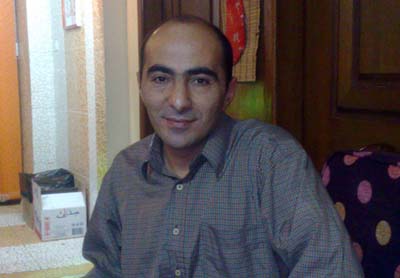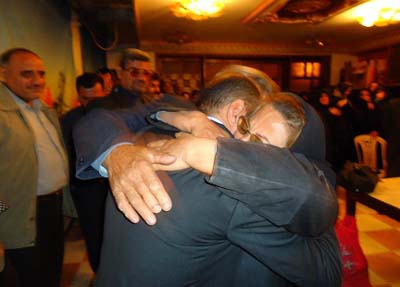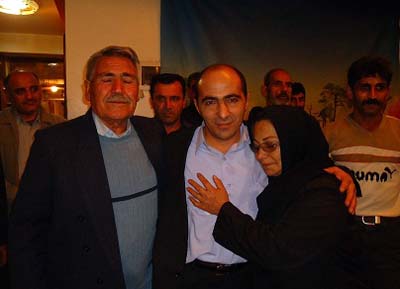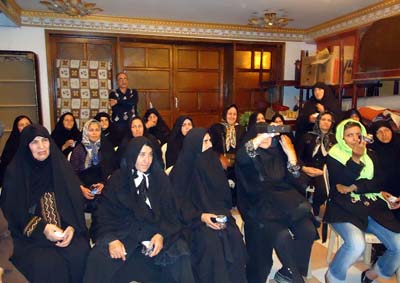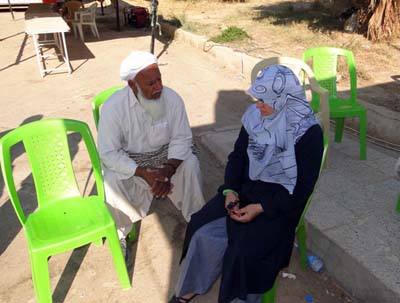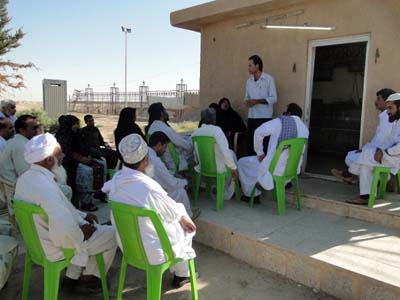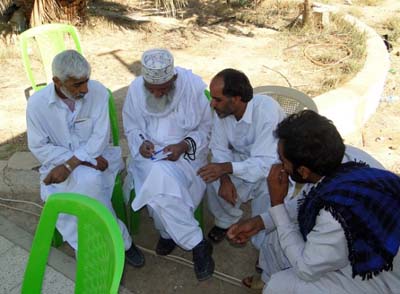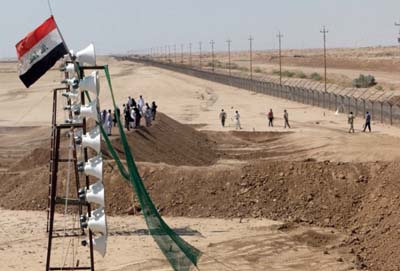Due to many contacts to Nejat Society Gilan Branch made by families, Gilan office held two gatherings in which families of Ashraf residents and former Ashraf residents took part.
The attendees in the meeting discussed crucial approaches to help rescue their family members imprisoned in Camp Ashraf.
Some former members of the MKO including Akbar Mohebi, Hamid Haji pour, Ghaffar Balafkandeh attended the meeting. They spoke for the families offering them suggestion to help release their loved ones.
The ultimate result of their discussion was that families’ active presence in front of the camp is a very effective tool for residents’ salvation and seems like a nightmare for the Rajavis.
One of the families who is an active member of Nejat Society Gilan Branch also prepared a paper to demand the international and human rights bodies to support the case of Ashraf residents. Other participants of the meeting signed the paper.
At the end of the meeting, the attendees congratulated Mr. Khavari the father of Sadeq Khavari on the release of his son from the cult of Rajavi. Sadeq recently could escape Ashraf. He hasn’t returned home yet because he has engaged to stay with families picketing at camp Ashraf and accompany them with their cause.
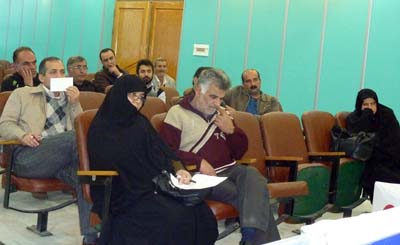
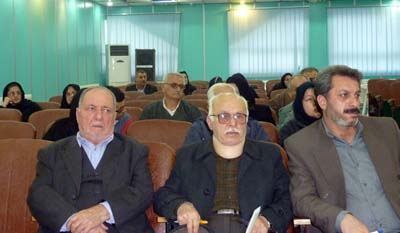
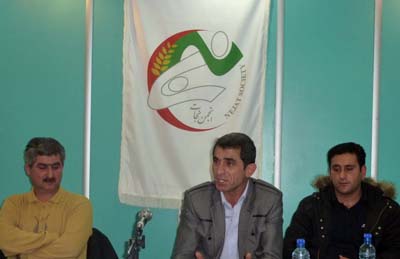
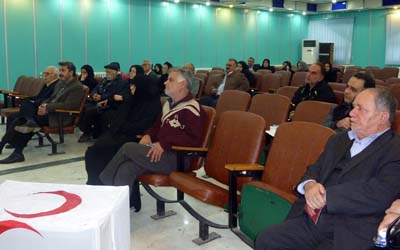
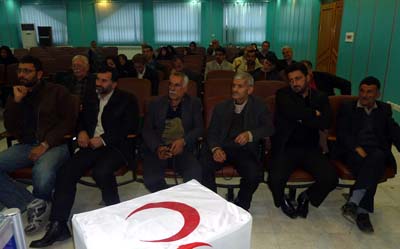
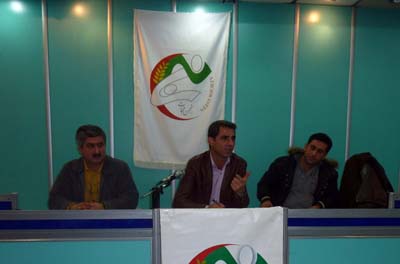
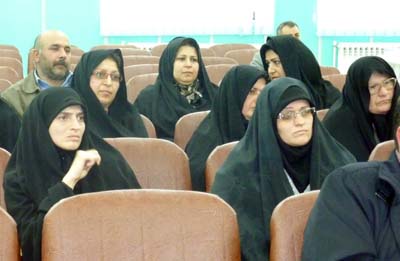

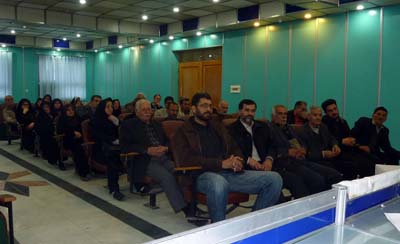
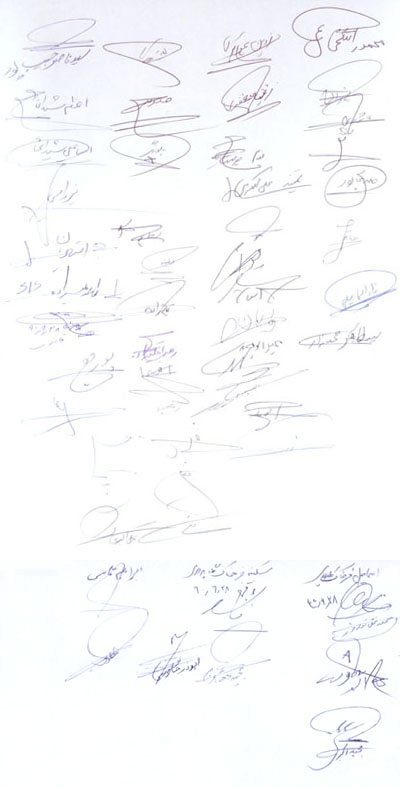
Uncategorized
Thousands of Iraqi people held a demonstration in Tahrir square in central Baghdad to demand the immediate expulsion of the terrorist Mujahedin-e Khalq Organization (MKO) from their country.

Condemning MKO acts of terror, Iraqi protesters on Friday gathered outside Camp Ashraf, the base of the exiled group, to urge the government to close the notorious camp as scheduled for December 31.
The protest rally came one day after Iraqi Prime Minister Nouri al-Maliki rejected a UN appeal for the extension of the year-end deadline to shut down Camp Ashraf, saying that the Iraqi government cannot permit a criminal gang to remain in the country.
Baghdad considers Camp Ashraf and its residents as a threat to its national security and insists it is determined to close down the terrorist base by the end of 2011.
Camp Ashraf, about 120 kilometers (74.5 miles) west of the Iranian border, houses some 3,400 MKO members. The terrorist group has carried out numerous acts of terror and violence against Iranian civilians and government officials after they fled to Iraq in 1986, where it enjoyed the support of Iraq’s executed dictator Saddam Hussein.
The terrorist group is also known to have collaborated with Saddam in the bloody repression of the 1991 Shia Muslims in southern Iraq and the massacre of Iraqi Kurds in the country’s north.
Iran has repeatedly called on the Iraqi government to expel the group, but the US has been blocking the expulsion by mounting pressure on the Iraqi government.
While the MKO is designated as a terrorist organization under the United States law, and has been described by State Department officials as a repressive cult, The New York Times recently reported that Washington is mulling over removing the MKO from its terrorist watch list and giving refuge to its members.
Last month, European Union foreign policy chief, Catherine Ashton, said she would urge EU member states to accept the residents of Camp Ashraf.
Download Iraqis demand promised MKO expulsion
Mojahedin-e Khalq – Victims of Many Masters
Product Description
The fascinating story of the controversial life of Camp Ashraf in Iraq from its foundation in 1986 to the present day is told in this book. Originally created to accommodate the Iranian opposition 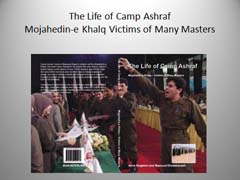
But, even years after the fall of Saddam the MEK still has the support and backing of many in the West and is therefore able to resist opening its doors to the outside world. It is the hidden life inside Camp Ashraf which renders it so controversial. The isolated garrison became the experimental ground for Rajavi to turn his group into a dangerous, destructive mind control cult.
Rajavi keeps the rank and file in the camp in a state of modern slavery to perform acts of terrorism and to fulfill propaganda roles in Western countries for the group’s many masters.
Massoud Rajavi’s methods of enthralling his followers include banning marriage and having children, instilling irrational phobic reactions to external factors, denying any contact with the outside world through radio, television, letters or telephones. In particular members must have no contact with their families. This book exposes the hidden life of the camp and its inhabitants. It speaks for the silent victims of the Rajavi cult and for the families who wait outside the camp for news of their loved ones.
In conclusion, the book examines the ways to deal with the problem of how to dismantle a dangerous destructive mind control cult and free its members as various parties vie for control over the group for their own agendas.
CONTENTS Page
INTRODUCTION 1
1965 – 1986 THE MEK AND IRAQ 4
1986 – 1991 THE GOLDEN AGE 18
1988 – 1993 THE IDEOLOGICAL PHASE 37
1991 GULF WAR ONE 50
1991 – 1997 THE MEK’S DECLINE 61
1997 – 2003 CAMP ASHRAF PRISON – NO EXIT 84
2003 – 2007 THE MEK PLACED ON LIFE SUPPORT 104
2007 – 2009 A GROWING HUMANITARIAN CRISIS 130
2009 INEVITABLE CHANGE 153
CAMP ASHRAF – PAST ITS ‘BEST BEFORE’ DATE 174
CONCLUSION 196
APPENDICES 201
INTRODUCTION
The controversial life of Camp Ashraf from its foundation to the present day makes a fascinating story in itself. The camp was created by Saddam Hussein in 1986 to accommodate the Iranian opposition group Mojahedin-e Khalq (MEK) and its leader Massoud Rajavi. Founded in 1965 the MEK first took up arms to try to oust the Shah. Two years after the 1979 Iranian revolution Rajavi tried to engineer a coup against Ayatollah Khomeini. It failed and he fled to Paris in 1981. Rajavi then tried to conduct his armed struggle against the new Islamic Republic from Paris but when this failed he was given succour in Iraq where Camp Ashraf became the MEK’s main military and ideological training base.
The close relationship between Saddam and Rajavi led to the MEK being dubbed Saddam’s Private Army; Camp Ashraf played an integral role in the survival of the Iraqi dictator after the First Gulf war when Rajavi used his forces to help crush the Kurdish and Shiite uprisings. In 2003 Camp Ashraf became an enemy target for the Multi National Forces when Operation Iraq Freedom removed Saddam Hussein from power. Then in a paradoxical move the US Government provided military protection for Camp Ashraf for eight years while its inhabitants remained on the US Terrorism List.
Camp Ashraf came under the control of the democratically elected Government of Iraq in January 2009 (under the Status of Forces Agreement). After that time it was inevitable that the camp would close. Successive Iraqi governments since 2003 insisted that the Americans close Camp Ashraf and expel the foreign terrorist group Mojahedin-e Khalq from the country because of the group’s history of terrible crimes against the people of Iraq.
In the course of twenty five years Camp Ashraf has seen many changes. But the real story of course is not about the camp but about the lives of the people who inhabited it; how they came to be there and why they must now leave.
In its forty five year history, the MEK organisation has undergone many public image changes; from guerrilla fighters, resistance army, terrorist entity to feminist democratic opposition. The man who has led the group through all these superficial incarnations is Massoud Rajavi. And behind the glamorous advertisements of a sophisticated and relentless propaganda machine, his single-minded pursuit of power at any cost and his fundamental belief in the use of violence to achieve this aim of power, has not changed one iota in all this time.
Rajavi was a charismatic speaker and skilled psychological manipulator. He discovered in himself a talent for totalitarian control which matched his narcissistic ambition for power. Although he began to convert the Mojahedin-e Khalq organisation into a cult while still in Paris, it was the acquisition of the isolated, closed world of Camp Ashraf which provided the perfect crucible to extend his experiment. In Camp Ashraf he has forced the MEK members along a most extraordinary route of mental and physical anguish to meet his needs.
Over the years former members who escaped from Camp Ashraf have told their stories to a world unwilling or unable to listen. Thousands of them consistently and courageously described the conditions of the internal revolutions and Rajavi’s bizarre requirements for members to divorce and to remove all the children from the camp; to undergo the daily humiliations of public self-confessions which enforce the celibacy and gender apartheid; to suffer micro-management of their every waking moment which imposed deliberately exhausting work schedules and disorienting indoctrination sessions; to be deprived of any information from and contact with the outside world and their families. Rajavi did all this to keep his members from leaving. When this failed, he imprisoned them.
Camp Ashraf is now a double prison for the residents. They are trapped by Rajavi’s psychological manipulations which engender paralysing fear in everyone behind the barbed wire fences which he has had erected to keep them physically inside. But they are trapped ultimately by the misguided ignorance and misplaced sympathy of all those external agencies which could take action to free them but don’t.
The life of Camp Ashraf has reached a critical juncture. It must close. The residents must leave. But over and above Massoud Rajavi’s refusal to leave, there are a host of third parties with their own agendas which militate against closure. The main players are the Americans and the Iranians who have developed their own narratives and myths around the MEK in order to use it as a tool to aggravate and intensify their thirty year enmity. Between the ‘bomb Iran, regime change’ pundits in America and the ‘crackdown on foreign backed violent opposition’ proponents in Iran, all the bases are covered.
It is these voices which dominate political debates and media reporting on Camp Ashraf. But the political and security issues are a decoy to avoid answering the fundamental question. After twenty five years of testimony describing severe human rights abuses why do the individual residents of Camp Ashraf still have no voice? Why do people continue to escape the camp even in spite of the severe restrictions? At the time of Saddam Hussein perhaps these questions could be ignored. But now?
The original inspiration to write the story of Camp Ashraf came from witnessing the determination of the families of the camp’s residents to rescue their loved ones. Since 2003 they braved bombs and bullets to reach the gate of Camp Ashraf in the hope of finding their relatives. They refused to give up, refused to take no for an answer. Even when the MEK began to pelt missiles at them they refused to give up. Their extraordinary love and courage needs to be voiced and this voice needs to reach above the cacophony of the false hand wringing and political wailing to those who are in a position to help.
But as the story unfolded it became obvious that the really voiceless victims of Camp Ashraf are its residents. As the stories of individual members emerged it was clear that many had died and many more had suffered before their information could reach the public domain. Currently around 3500 people continue trapped and held hostage to the callous whims of the various pitiless powerful political forces who do not care about their individual fates. This book must speak out on their behalf.
This book therefore is an attempt to tell their story in the hope that this will halt the diversion of this issue to everything else except this fundamental question – why are people risking everything to run away from Camp Ashraf and the MEK and why is no one listening to them?
By Anne Singleton and Massoud Khodabandeh
First published September 2011 by IRAN-INTERLINK
Download The Life of Camp Ashraf
Download The Life of Camp Ashraf
Hundreds of families picketing in front of Camp Ashraf held a protest rally on Friday December 23rd and called on the Camp leaders to release their loved ones held as hostages by the leaders.
Families of Ashraf residents started the rally, walking from northern side of the camp to western side and chanted slogans in front of Asad Gate. They vigorously urged on visiting their children.
Relatives of Ashraf prisoners are ready to endanger their life to help with salvation of their family members imprisoned in the cult of Rajavi.
They also played audio messages recorded by some of dissociated members of the MKO, via loudspeakers.
At the end of the gathering families appreciated the cooperation made by all those who make efforts for release of Ashraf residents including, Iraqi, Iranian and American government.
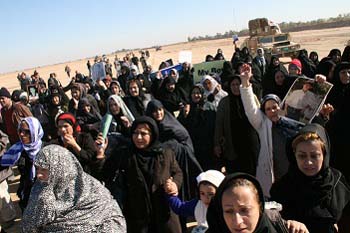
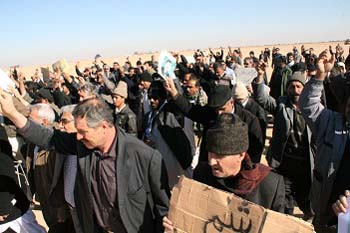
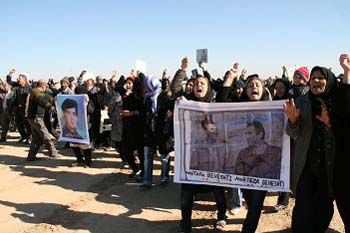
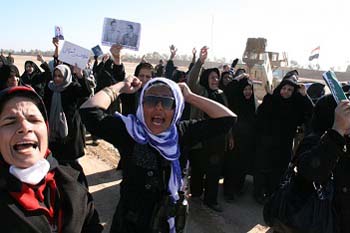
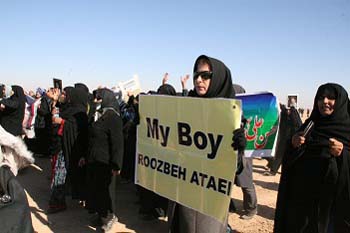
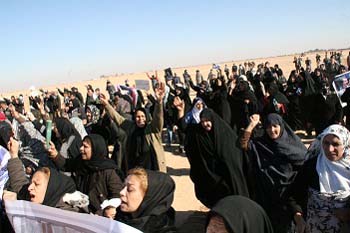
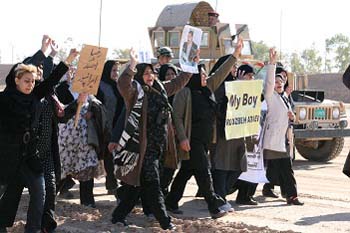
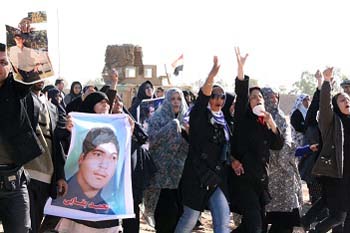
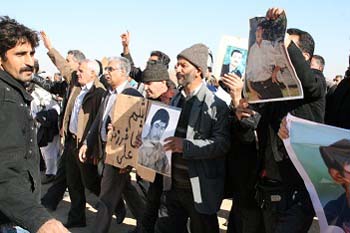
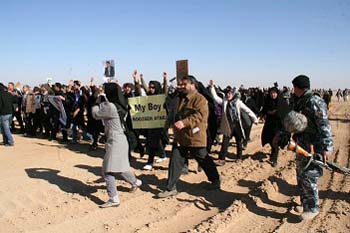
 Former CIA officer Philip Giraldi discusses his article “Washington’s Secret Wars;” Obama’s newly signed “findings,” authorizing covert operations to destabilize the Iranian and Syrian governments; how the US and Israel use the Baluch Jundallah, Kurdish PJAK and MEK groups to commit terrorism-by-proxy; the MEK’s energetic and well funded campaign to get de-listed as a terrorist group (in order to more easily commit terrorist acts); and how the 1996 neoconservative policy document “A Clean Break: A New Strategy for Securing the Realm” is going according to plan.
Former CIA officer Philip Giraldi discusses his article “Washington’s Secret Wars;” Obama’s newly signed “findings,” authorizing covert operations to destabilize the Iranian and Syrian governments; how the US and Israel use the Baluch Jundallah, Kurdish PJAK and MEK groups to commit terrorism-by-proxy; the MEK’s energetic and well funded campaign to get de-listed as a terrorist group (in order to more easily commit terrorist acts); and how the 1996 neoconservative policy document “A Clean Break: A New Strategy for Securing the Realm” is going according to plan.
Philip Giraldi, a former CIA officer, is a contributing editor to The American Conservative and executive director of the Council for the National Interest. He writes regularly for Antiwar.com.
Download US backed MEK assassinated Iranian Scientists
A group of Iraqi tribal leaders and officials, as well as some foreign agencies have called members of the Mujahedin-e Khalq Organization (MKO) to be expelled from the country, Press TV reports.

At a Friday conference held in Iraq’s capital Baghdad, the participants discussed the presence of the MKO in the country and its consequences for the Iraqi people .
“The Iraqi government has responded to the people’s calls and decided to evacuate the MKO camp in Iraq and expel its members from Iraq by the end of the year,” said Nafe al-Esawi, an organizer of the conference .

Members of the MKO fled to Iraq in 1986, where they enjoyed the support of executed Iraqi dictator Saddam Hussein, and set up Camp Ashraf in Diyala near the Iranian border .
Conference participants criticized the US for its failure to help put an end to the presence of the terrorist group in Iraq
.

“Unfortunately the American forces have failed to dismantle this camp and have left it on the hands of the Iraqi government. I thank the Iraqi government for their patience; I thank the Iraqi people for their patience,” said head of the Middle East Strategic Delegation Massoud Khodabandeh .

The group has carried out numerous acts of terror and violence against Iranian civilians and government officials
The terrorist organization is also known to have cooperated with former Iraqi dictator Saddam Hussein in suppressing the 1991 uprisings in southern Iraq and the massacre of Iraqi Kurds in the north .
“The MKO has left bloody memories in the Iraqi people’s minds, and the Iraqis today will not tolerate their presence. No country will accept to allow such terrorists on its soil,” said Adnan al-Shahmani, Iraq’s State of Law Coalition MP .
Tehran has repeatedly called on the Iraqi government to expel the group, but the US blocks the expulsion by pressuring the Iraqi government.
Hundreds of Iraqis from different parts of the country held a protest to show their support for the Iranian families who have been waiting for more than six months to see their family members and relatives who reside in the camp Ashraf.

Camp Ashraf, has been the principal home of the anti Iranian group known as Mujahedeen Khalgh organization or MKO since the group allied itself with Saddam Hussein in the 1980s, receiving weapons and training from his regime.
A number of Iraqi officials and tribal leaders were among those who had gathered to have their voice heard. The protesters carried banners with anti-MKO slogans on condemning the MKO presence.

A number of defected MKO members were among the Iranian families, they stated that they have been living in dire conditions and deprived of their rights.
During the protest the Iraqi officials urged the government to expel the MKO members from Iraq as scheduled, saying any delay in doing so may give members of the group enough time to launch attacks against the civilians living near their camp.

Many here are concerned about the possibility of interference by the UN to keep the MKO in the country.
The MKO is listed as a terrorist organization by much of the international community, and is responsible for numerous terrorist acts against both Iranians and Iraqis. The group is especially notorious in Iran for siding with former Iraqi dictator Saddam Hussein during the 1980-1988 Iran-Iraq war.
Wisam al-Bayati
Download Anti-MKO protest held in Iraq
The Iraqi government has announced that the end of 2011 will witness the evacuation of the MKO camp and expel of its members from Iraq.

In a press conference held at the Iraq Cabinet building with the presence of the representative of the UN’s Secretary General Mr. Martin Coupler and a number of International Human Rights organizations and ambassadors, the Iraqi Prime Minister’s advisor stated that the Iraqi government will not allow the MKO members to remain in Iraq after 2011.
During the press conference, the Iraqi Prime Minister’s Advisor stressed that the Iraqi constitution is not permitting such terrorist organization to remain in Iraq.
The United Nations stated that the Iraqi government is acting according to the International standards and the Iraqi constitution.

The representative of the UN’s Secretary General said that the United Nation is directly involved in the issue and called for finding a peaceful solution for the MKO issue in Iraq.
The MKO is listed as a terrorist organization by much of the international community, and is responsible for numerous terrorist acts against both Iranians and Iraqis.
The group is especially notorious in Iran for siding with former Iraqi dictator Saddam Hussein during the 1980-1988 Iran-Iraq war.
Wisam al-Bayati
Download Iraqi government do not allow MKO to remain in Iraq
Baluch families of 16 MKO terrorist cult captives travelled to Iraq, Camp Ashraf on September25,2011 to save their beloved ones who are brainwashed and manipulated by the Cult leaders.
Among them are elderly parents as well as teenagers. They are decided to save their beloved ones from the paws of MKO Cult leaders.
Mohammad Rostami escaped the cult of Rajavi on sep.17, 2011 after twenty-two years of membership in the MKO.
He met his parents on November 4th after years of separation. The Rostamis hugged and kissed their son warmly with tearful eyes. Other families picketing in front of Camp Ashraf witnessed the emotional scene, congratulating the Rostamis for visiting their beloved son after twenty-three years.
